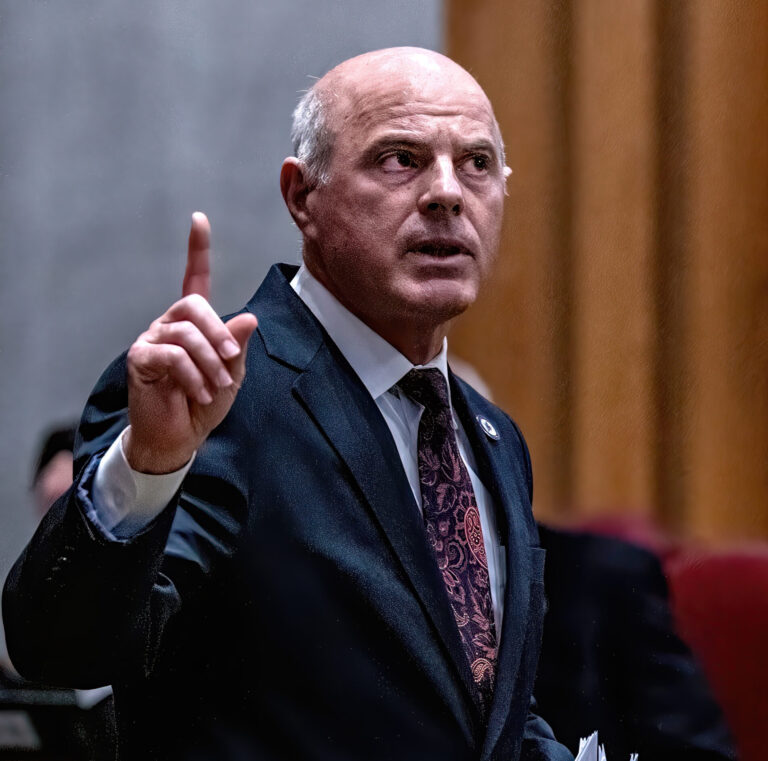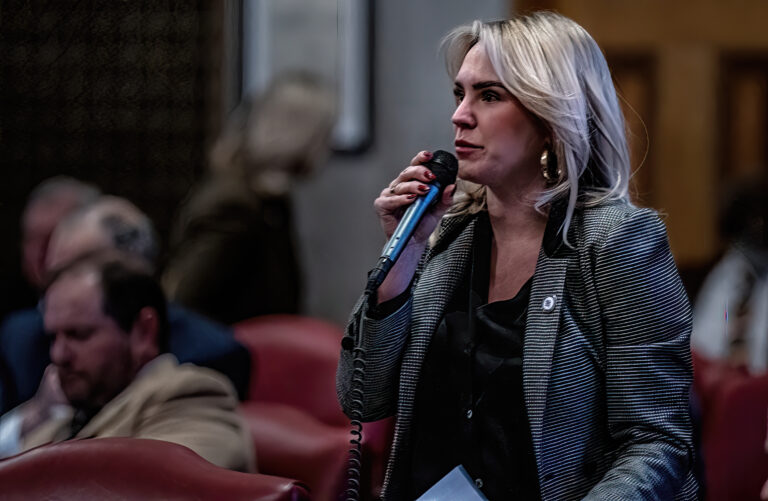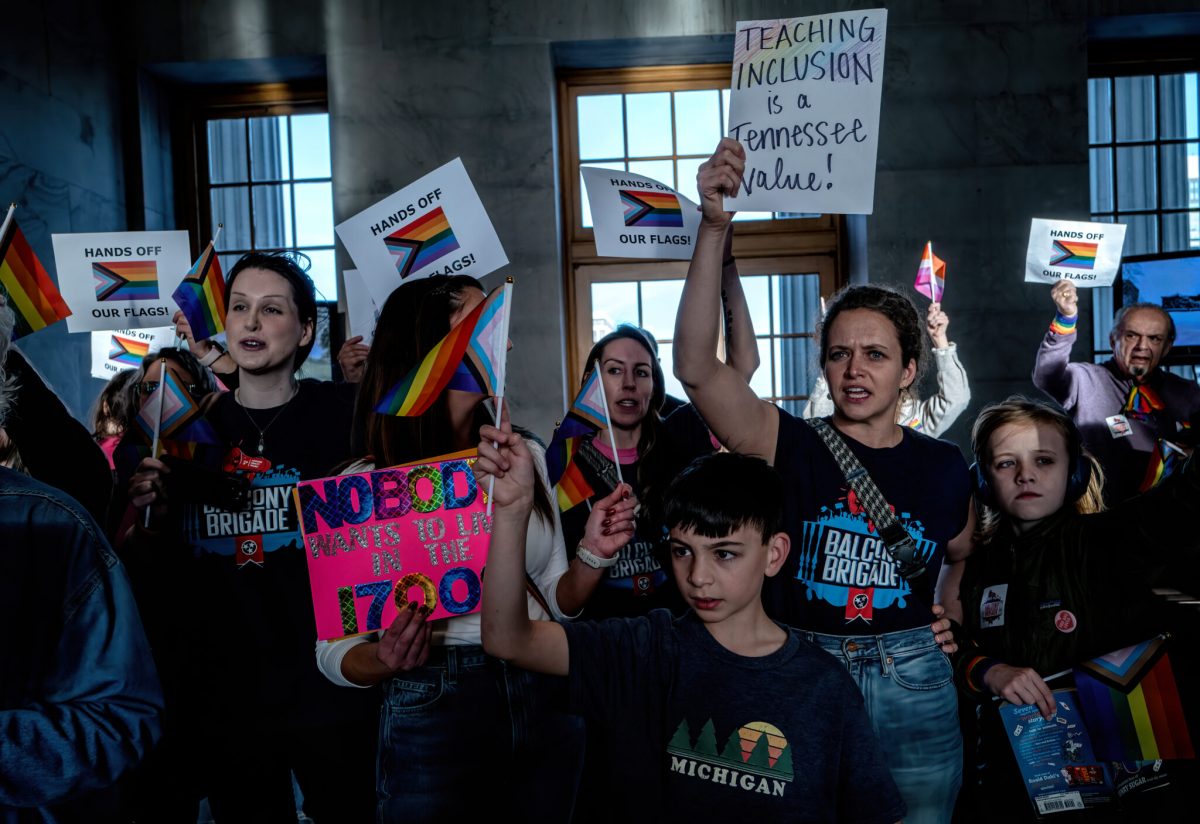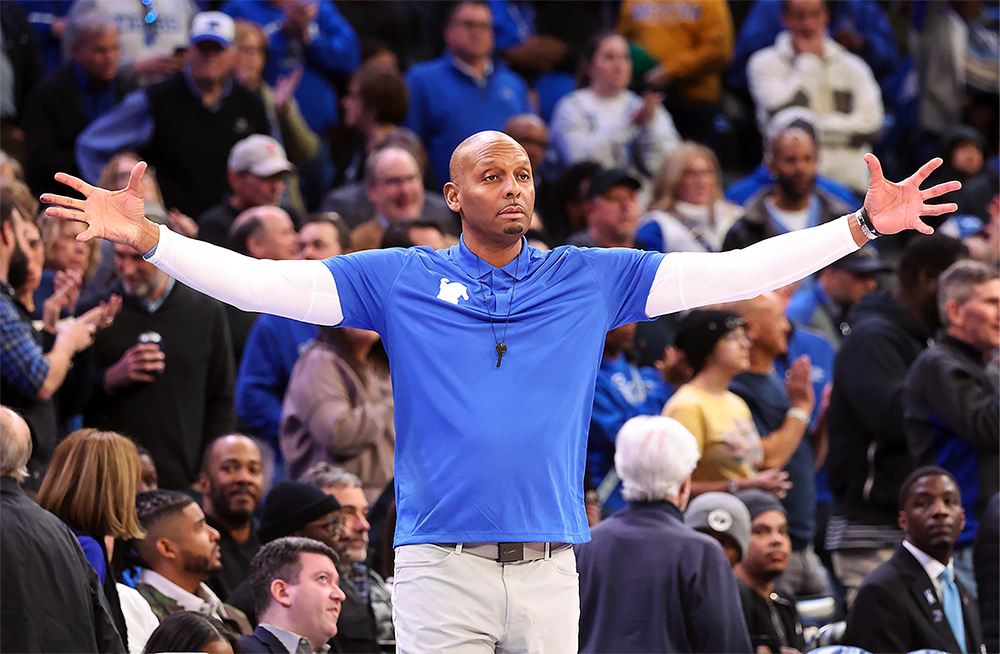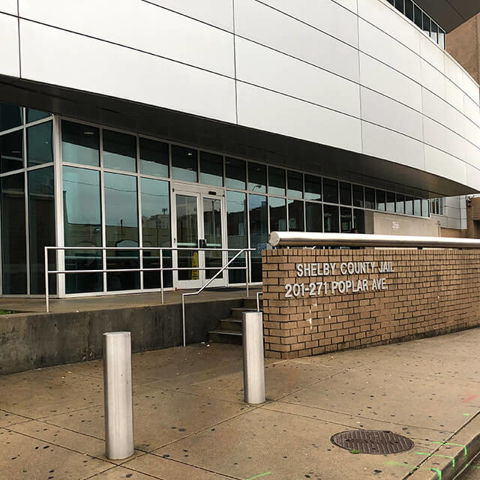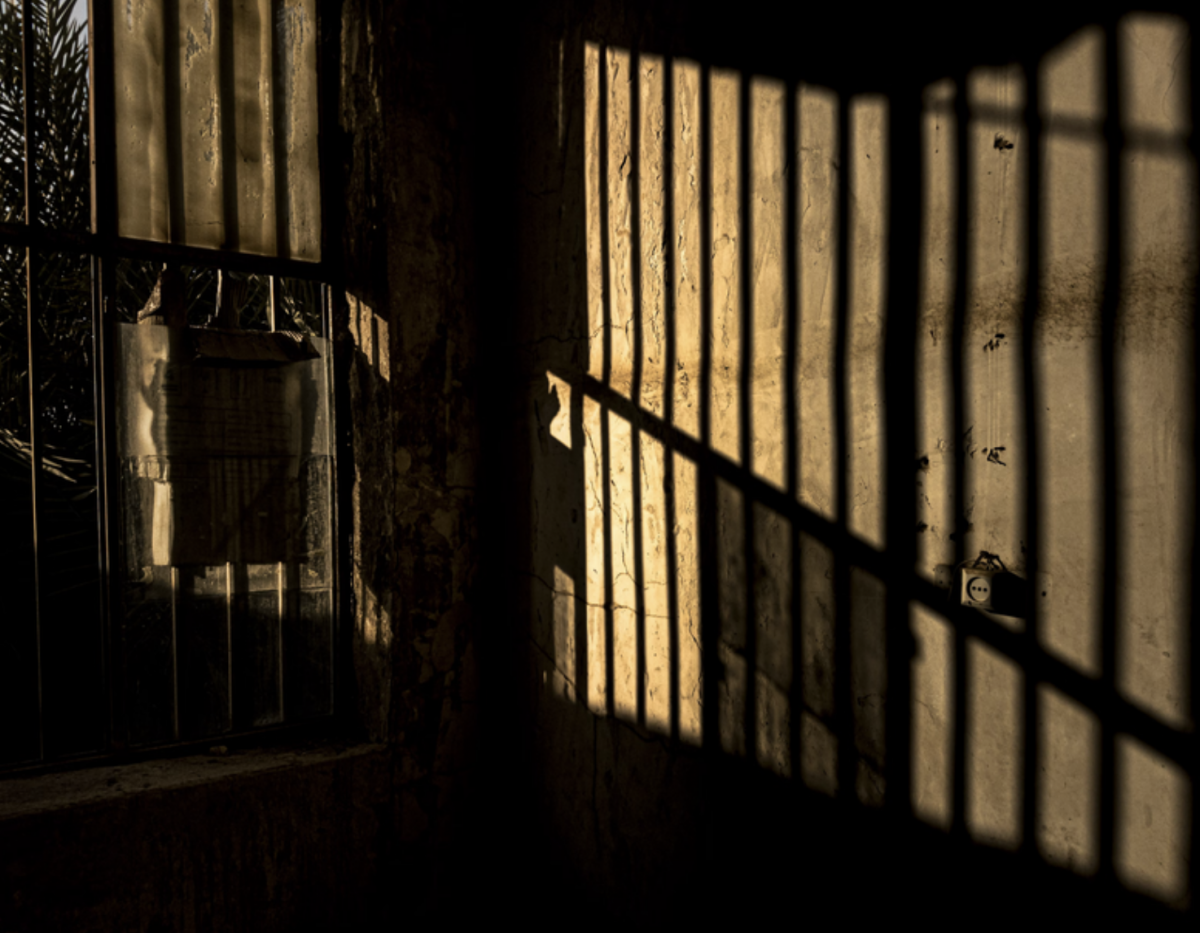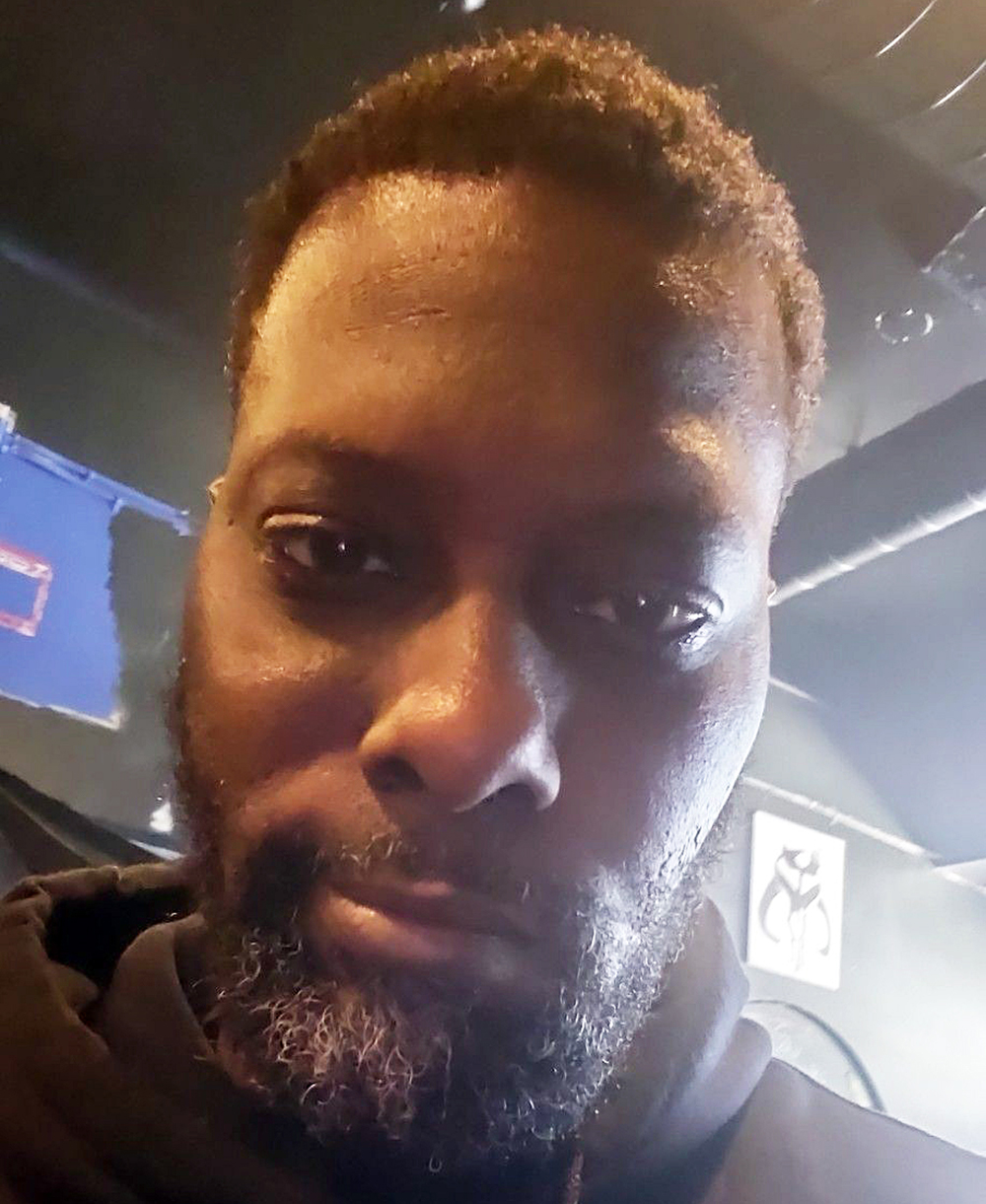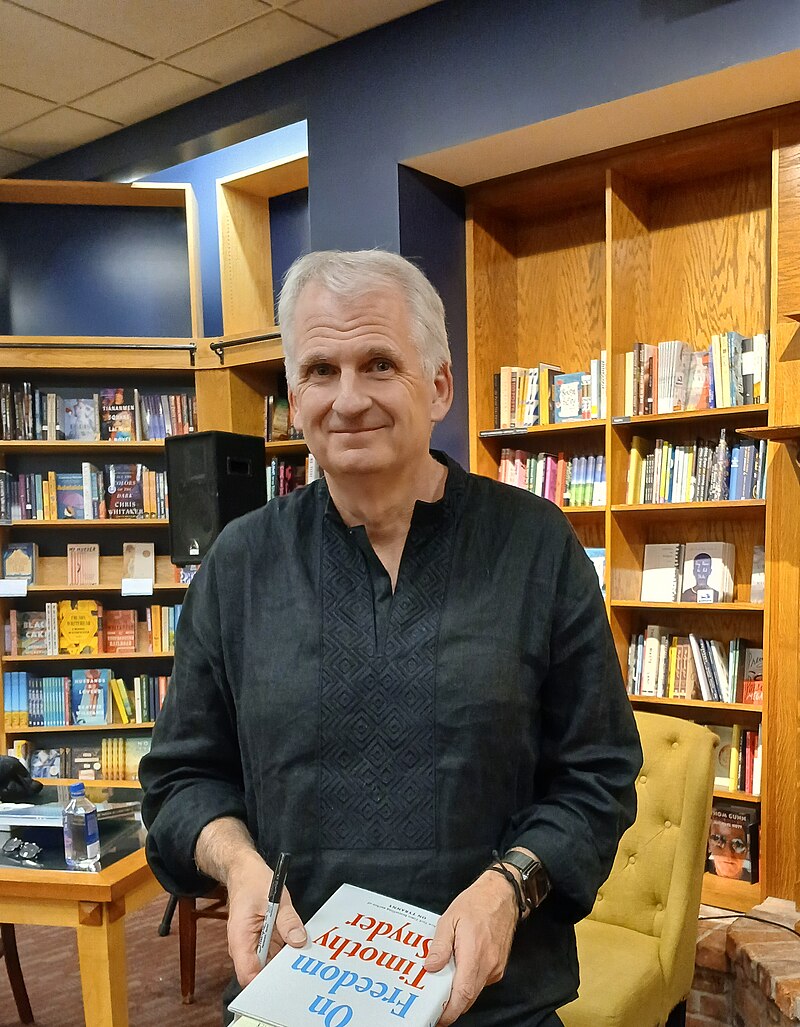Leading up to the last election, millions of Americans were aware of the creeping fascism of the Republican Party, who’ve fallen in line behind a power-hungry authoritarian kingpin like a Russian duma. Yet many of us have felt blindsided by the rapid evisceration of government services, the warrantless apprehensions of immigrants, and the further flouting of law, treaties, and decency that have ensued since Inauguration Day. How are we to make sense of it all?
Timothy Snyder is more than a teacher, and more than the Richard C. Levin Professor of History and Global Affairs at Yale University: He has been a reliable public voice of reason, critique, and perspective since the first Trump administration. His 2017 book, On Tyranny: Twenty Lessons from the Twentieth Century, quickly became a bestselling guide to navigating what he’s called “America’s turn towards authoritarianism.”
Now, his latest work, On Freedom, approaches the same issues from a perspective that’s both more personal and more philosophical. In anticipation of his upcoming appearance at Rhodes College on Sunday, March 30th, Snyder took some time to speak with the Memphis Flyer about his thoughts on democracy and freedom, and how they might apply to our city in particular.
Memphis Flyer: In your new book, you speak of the “labor of freedom,” the ongoing work we must put in if we want to see democratic principles made real. I wonder how you see that in relation to what Neil Postman called “amusing ourselves to death,” the deep immersion in entertainment media that Americans seem to crave. Is it hobbling our ability to stay engaged as citizens?
Timothy Snyder: You’re absolutely right. Freedom is something that you have to work for. It can’t be given. If it’s given, it’s not freedom. And this does run against our intuitions. We’d like to think that freedom can be given to us by, you know, the ancestors, the Constitution, capitalism, American exceptionalism, history. But if it’s given, it’s not freedom. And worse, anybody who tells you a story about how it’s given is drawing you into authoritarianism, because if you believe that something’s going to give you freedom, then that means that you’re being taught not to act for yourself.
And that’s because, second point, freedom has to depend upon the unpredictable, eccentric combinations of things that each individual cares about and their ability to realize those things, those values in the real world. And so freedom isn’t just an absence of constraints. It’s not just being able to do what your impulses tell you to a given moment, freedom is something much bigger. It’s about becoming yourself. It’s about acting as the unpredictable, unique person you are, and changing the world in a way that only you can change it.
Which leads to a third point: Freedom always has to be something that we do together. We can’t achieve things by ourselves, because some of the basic elements that will need to be free, unpredictable people can only be built over generations working together, and those are very simple things like roads or schools or health care, or the rule of law, or whatever it might be.
And so it follows that if we train our brains to be stimulated all the time, to be entertained all the time, then we’re not training ourselves for freedom. We’re training ourselves to think that everything’s going to come to us, right? The stimulation all comes from the outside. We’re not questioning the frameworks. We’re putting our heads inside a framework. And also, we’re using up all the time next to the screen. We’re not getting our bodies out into the world, which is also very important. So when Postman was writing, we didn’t have the internet. The internet makes that point, unfortunately, ten times more applicable than it was before.
Your point almost echoes Plato positing that we have to build the perfect republic in our own mind, in the individual, for the Republic to exist in the world. It has to start with this interior initiative. Is that why On Freedom includes such personal, autobiographical passages?
The main reason I use so much personal material was to show that I have made a lot of mistakes [laughs]. And this is, I think, very important for a book about freedom, because a person who says they’re always right can’t possibly be a free person. The only way to be right all the time is to be living inside a story which you just modify no matter what you do so it turns out that you were right. And this is one of the things that’s very troubling about our Vice President, for example, is that no matter what happens, he’s yelling at other people, I mean quite literally, that they’re wrong and he’s right. He has this need to say that all the time to people who actually know what they’re talking about, in situations where you know, to put it gently, he isn’t completely correct or knowledgeable or an expert. And so freedom has to be a matter of accepting that you make mistakes, and moving on from them.
And also, another point is, I don’t think freedom can be written about point by point, the way that Plato was trying to write. I don’t think you can do it kind of paragraph by paragraph, building up a case. I think you have to accept that freedom is somewhere between people, and so you have to work in the writing to find ways to communicate to other people. So I share things about myself, about being young, about being sick, about being a parent and so on, as a way to reach out to the other person. Because it is a movement, but it’s not just an interior movement. I mean, it has to be a movement from the inside of yourself out to the inside of another person. Empathy, as I see it, is very central to freedom.
And this is a way that my book is different from other books. Usually, we start in the U.S. from the idea that we can be completely alone and we can be completely isolated, and we can just rebel against stuff around us, and that’s going to make us free. And I just think that’s completely wrong. If you’re completely alone and isolated, you’re going to be alienated and unhappy, and you’re going to make bad decisions, and you’re not going to be free. You’re also not going to be self-critical, or know when you’ve made mistakes. Freedom has to start from recognizing that other people are in the same predicament that we are in, learning to see yourself also from their point of view, and thereby becoming more knowledgeable about yourself. I think that’s a necessary condition for becoming a free person.
I’ve always struck by Ralph Nader’s idea of the “citizens toolbox,” calling for more town hall-style meetings, and other ways to participate in groups. In your travels and your historical thinking, can you point to any really strong examples of people building democracy from the ground up again?
That’s, that’s a wonderful question, because democracy, of course, can’t be built by a bunch of individuals who are alone in their houses, staring at screens. The thing that you should be doing is trying to organize people to do things that are beyond the screen. And I think that’s kind of the big trick of 21st century organizing. Of course, you have to spend time on social media, but you need to spend time on social media getting other people out to do things in the real world, because human contact is really special. It’s not depressing, it’s encouraging. It allows you to break the cycle of just reacting to everything that’s going around you emotionally, and allows you to act sensibly and in a way which also ends up improving your overall emotional state.
As far as examples, all the recoveries of democracy in the late 19th, late 20th, and early 21st century have to do with some kind of movement, some kind of mass movement, which goes beyond political parties, and goes beyond the existing framework. And I want to just make a little footnote to that: a lot of folks are saying, ‘Well, the Democrats should do more.’ And no doubt, the Democrats should do more, no doubt individual elected officials could do more, but there’s a certain way in which asking elected officials to do more is missing the point, because it’s really down to the citizens. It’s down to the citizens to organize creatively, to create more opportunities for elected officials. Because if we’re not out there building some kind of a movement, if we’re not literally creating a scene for them, then they can’t really act in that scene. If we don’t build up that civil society, we are, in effect, keeping them in their traditional role and not giving them anywhere else to go, right?
So what I worry about is that when people say, ‘Oh, the Democrats should be doing more,’ it’s like you’re kind of repeating the mistake. I mean, sure they should be doing more, but we also have to do more.
You ask for specific examples. So the one that comes to my mind an awful lot lately is Solidarity in Poland, which was a labor movement, which you can’t really classify as being either left or right, which involved workers even though at the beginning most of its members were not workers, which was outside the normal rules of the game, and which didn’t fit into people’s preoccupations about what was possible in in a given moment. But that was in 1980-81. Since then, in the intervening 45 years, pretty much all the examples that I can think of, of democracies being recovered, have involved some kind of mass movement which went beyond a political party. At the end of the day, a political party might be helped by it and join with it or overlap with it, but the movement is the key.
So part of your point is, it’s up to local actors to invent these forms, these movements. I appreciate that in your book, there’s an emphasis on improvisation, or adaptability. And that that’s part of what makes democracies and freedom in general, more resilient. Is that a fair statement?
Yeah, yeah. No, I love that. That’s really good. Democracy is not like a car, right? Like, I have this feeling that a lot of people think democracy is like a car, you know, and it runs one day and it runs the next day, but then on the third day it stops running. And so what do you do? You get out and you start kicking the tires. But democracy is not like a car. It’s not something which is meant to run on its own. If it exists at all, democracy is always the result of people doing the things they care about together. It’s not a machine that either runs or breaks down.
[Automated voice breaks in]: ANNOUNCEMENT 19: WE’RE SORRY. THE NUMBER YOU HAVE DIALED HAS CALLING RESTRICTIONS THAT HAVE PREVENTED THE COMPLETION OF YOUR CALL. [Phone disconnects].
[I call Snyder back]: Sorry, that was very Orwellian.
I hope that makes it into your article!
Let’s switch metaphors. In Zen and the Art of Motorcycle Maintenance, Robert Pirsig talks about how there are two kinds of people who ride motorcycles. There are the ones who just want to go, and then there are the ones who like to tinker. And if you want to have democracy, you have to be a tinkerer, which isn’t to say you have to know how everything works, but you have to know how something works, or how to try to figure out how something works —whether that’s the school board, or the city council, or the public library, you have to know how something works, and you have to be active at some level. I think the mistake people make is to say, ‘Well, either we’re going to have democracy or not, and that’s all going to be decided in Washington by big people who are far away.’ And that’s not it at all, right? Although big people who are far away are going to do their best to make you think that, because if you think that, you’re not going to do anything.
It seems like the implication is that so much of this has to happen on the local level, in those face-to-face encounters. I’m wondering if you have any case studies that might apply to Memphis, as we’re currently coping with Elon Musk’s Colossus supercomputer, and there’s this tension between the Greater Memphis Chamber of Commerce and City Hall rolling out the red carpet for him, with almost no public debate, despite the grave doubts of everyday citizens and environmental activists in Memphis. Have you seen case studies dealing with similar oligarchs who are squatting down in the middle of communities, and how those communities can push back?
I can’t claim any personal familiarity with the situation in Memphis, so I’m going to limit myself to just a couple of general points. The first is that Musk is an extreme case of people who look for unregulated environments where they’ll be able to do whatever they want. Different companies are better and worse about this, right? But he’s an extreme case of someone who seeks out an environment where he’s going to be completely at liberty to do whatever he wants.
The second point is that his record can be checked in other cities, in other places where he’s done business, like Texas. And the third thing, which is worth noting, is that his businesses are tanking. He has a big name and a big reputation and all that, but pretty much all of his businesses are tanking right now. And so the idea that this is some kind of sure-fire investment, I think, is unclear.
And that’s related the fourth point, which is that this is a person who’s assisting in a drastic attempt to carry out regime change in the United States. I don’t think one can just ignore that basic fact, because you’re then choosing to bring to Memphis all of the consequences of that, right? The guy has hundreds of billions of dollars, and he’s trying to change the entire structure the United States. And so if you decide to bring him to your county or your city, you’re bringing that too, with all the consequences of that, forever.
That’s a great point: We have to keep the big picture in mind, even as we act locally.
Yeah, and there’s always going to be the thought that outside investment is good. Our community needs investment. And then it’s up to local people to say, ‘Well, wait a minute. Who are the investors? What is their record? What are the positives and negatives on balance. What does this do to our community?’ So of course, the role the Chamber of Commerce is going to be the role the Chamber of Commerce. And it’s a legitimate role. I would say that’s not the only argument. People have to rise up, explain, creatively protest, and make all of the arguments, rather than treat this as something which just has to automatically happen, because ‘investment’s always good.’ Not all investment is good.
It seems that the left, or progressives, or whatever you want to call the current anti-fascists, could take a page out of the Republican playbook in as far as we should be leaning into local offices: school boards, city councils, that sort of thing. Have you seen that happening in response to the national political climate?
Yeah. First of all, I just want to agree with the premise that people should be running for office at all levels. From township trustee, or whatever you call it in Tennessee, through governor, through senator, people should be running for office, and especially for local office. There are too many races that are unopposed, and you’re right that the Republicans have done well by caring about that. And in my view, the Democrats hurt themselves with the notion that we have the more charismatic dynasties and we’re in control of the presidency forever. That didn’t turn out to be true. It was a bad, bad premise, because in the end, it’s what happens in the states that, over the long term, is going to determine who’s president, and not not the other way around. The funnel goes from the local to the state to the federal, and not the other way around. In the short term, the federal government can do lots of things, but in the long term, as you say, the Republicans are right about this: the funnel of historical action is from local to state and then ultimately to the federal.
Finally, I wanted to ask about your thoughts on the politics of race and how entrenched they seem now. I’m an anthropologist by training, and learned early on that race is an absolute fiction in the biological sense, even if it is, you know, imprinted on bodies, culturally, and so forth. Yet it’s a political force that seems to dovetail with your concepts of “sadopopulism” and “the politics of eternity.” Could you elaborate on those terms with regard to the politics of race?
Yeah, of course. So, by sadopopulism I mean a politics which is trading not in goods, but in pain. A populist might make promises. They might need to be unreasonable promises, but a populist is saying the government can do something for you. A sadopopulist is saying the government won’t really do anything for you, but our inaction is going to hurt other people more than it’s going to hurt you. And I think that captures a lot of American life. And it goes back to the to the question of what freedom actually is. Because it’s true: If we don’t do anything, if we’re inactive, if we just make the government small, or we don’t want the government to do anything, it’s always true that somebody else is going to suffer more. And in the U.S., very often white people are being told, implicitly or explicitly, that it’s the Black people who are going to suffer more. It’s the immigrants who are going to suffer more. That can become a kind of politics. You go from expecting the government to do things for everybody so that we’ll all have more opportunity, to thinking, ‘Okay, well, the government’s role is to tell me where I’m supposed to direct my gaze, to watch the people who are having a harder time than I am.’
That’s what I’m afraid the federal government is now up to. It’s pulling back things that the federal government could do to make us all free, and instead it’s creating a spectacle where we’re supposed to look at the deportation, we’re supposed to look at other people’s pain and think, ‘Oh, that’s not me,’ and be satisfied with that.
By the politics of eternity, I mean the idea that there isn’t really a future, and that therefore we should be concentrating on a time when the country was innocent. This is a very dominant way that authoritarians practice politics, from Russia to the United States: the idea that there was a time when we were great, when we were not flawed, when we were pure, before everyone else came and spoiled it for us. How does that connect to race? Well, in America, that’s a kind of white utopia. It’s the notion that 100 years ago, only the white people ran everything, and everything was better then, we weren’t troubled then, we didn’t have troubled consciences. We didn’t have to think about things then, and everything worked then. And of course, none of those propositions are actually true. The United States in 2024 was a much better country than the United States in 1924 in every conceivable respect, and a lot of it has to do with the merit of people who are not white, insofar as they were allowed to take part in the broader economy and the broader political system.
Then the racial utopia of [the politics of eternity] becomes racial politics, right? Where white guys who are less competent then get thrown into roles for which they’re clearly unprepared. You know, there are a whole bunch of cabinet secretaries now who fit this bill, and really the only thing that makes them vaguely look like they could be prepared is that they’re white guys and they can tie a tie. And that only seems plausible because of a kind of aesthetic, a nostalgic aesthetic, like, ‘This person looks like they should be a cabinet secretary, because they’re a middle-aged white guy who can tie a tie.’
And so that’s a way that the politics of eternity comes in, as opposed to thinking about our country in terms of its future, its better futures which it could have, in which all kinds of smart and talented people come in from all kinds of angles. You know, people who’ve been here for 15 generations, and people who’ve been here for one, people of European ancestry and people of Asian ancestry and African ancestry or whatever it might be. Instead of thinking of our country as having a billion possible futures that mix up the talents of all these people, we apply this false vision of when certain kind of person controlled everything and try to bring it back. So that’s a way that race connects to the politics of eternity.
I guess the great irony is, you know, people like Elon Musk are always going on about the future, but it’s this kind of pie in the sky, let’s colonize Mars type of thing, as opposed to the future of Americans living or not living, as the case may be, in the near future here on Earth.
Yeah, no, I think the notion of bringing apartheid to the whole solar system is probably not actually going to happen. But yeah, you’re exactly right. I mean, what they’ve done is they’ve basically colonized the future, right? Instead of there being a kind of everyday, all-American future, we have instead these stupid ideas: let’s go to Mars, let’s live forever, right? And those things are completely implausible, and they won’t happen, but they take up the space of the future. They’re like these polluted clouds that fill the air, so we can’t see our way to actually possible futures, which are out there.
Timothy Snyder will speak “On Freedom and Just Habits of Mind” at Rhodes College’s McNeill Concert Hall on Sunday, March 30th, at 3 p.m., sponsored by the Spence Wilson Center for Interdisciplinary Humanities. Registration required. Visit Rhodes.edu/wilson for details.
